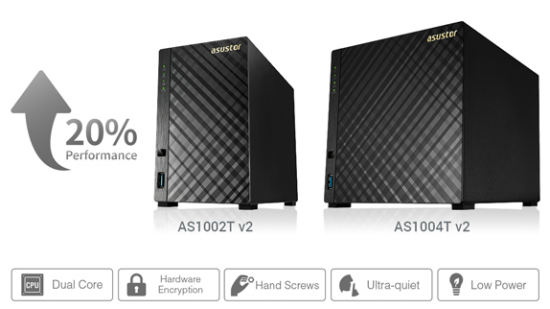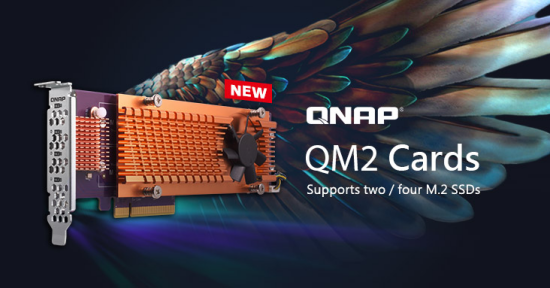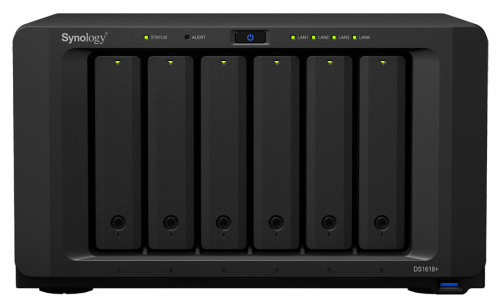- Details
- Network Storage
ASUSTOR Inc. today has announced two new NAS devices will be released; the AS1002T v2 and AS1004T v2. These new models are upgraded versions of the AS1002T and AS1004T and uses an upgraded CPU now at 1.6GHz, providing better read and write performance than the previous generation. In addition, the hard disk controller has been redesigned to allow a hard drive capacity of up to 12TB.

ASUSTOR product manager Johnny Chen said: “Compared to the previous generation, the write performance of the AS10 v2 series has increased by more than 20%, providing home users with a smoother and faster storage experience. In addition, ASUSTOR offers a number of energy-saving designs in protect the environment and save money. The NAS also can hibernate all day almost without consuming power, making it suitable for users who need a NAS for the long-term to create their own dedicated backup solution."
Add a comment- Details
- Network Storage
Synology Inc. today announced the official release of DiskStation Manager (DSM) 6.2, delivering a more reliable, efficient and secure NAS experience. The new Advanced LUN, iSCSI Manager, and Storage Manager provide professional users with a stable and powerful data protection solution.

“Eight months ago we released our DSM 6.2 beta program, with over 71,000 downloads, and received valuable feedback from users. In DSM 6.2, we focus on the stability and performance of new features." said Derren Lu, CEO of Synology Inc. "In the meantime, we took tens of thousands of hours testing on hundreds of machines to make DSM more stable and provide better IT management flexibility in every respect. Synology NAS do not just serve as network storage devices, but they provide a powerful and wide range of application services for business."
Add a comment- Details
- Flash Memory
 ADATA Technology, a leading manufacturer of high-performance DRAM modules, NAND Flash products, and mobile accessories today launched a new addition to its range of portable storage devices, the ADATA UV240 USB Flash drive. It features a convenient flip cap with a quick-slide mechanism to offer effortless cap removal while also doing away with the potential for misplacing the cap. The UV240 works in USB 2.0, comes in white/blue, black and red, and features capacities ranging from 8GB to 64GB.
ADATA Technology, a leading manufacturer of high-performance DRAM modules, NAND Flash products, and mobile accessories today launched a new addition to its range of portable storage devices, the ADATA UV240 USB Flash drive. It features a convenient flip cap with a quick-slide mechanism to offer effortless cap removal while also doing away with the potential for misplacing the cap. The UV240 works in USB 2.0, comes in white/blue, black and red, and features capacities ranging from 8GB to 64GB.
No More Misplaced Caps with Flip-Cap Design
Sporting a flip-cap design with a quick-slide mechanism, the UV240 has one less part to potentially misplace. The flip-cap design not only prevents users from losing the cap, it also allows it to be easily opened with a flick of a thumb. This simple yet intuitive design helps make the UV240 very satisfying to use on the go.
Lanyard Hole for Easy Carrying and Adding Personal Flair
Like most ADATA USB Flash drives, the UV240 has a lanyard hole for securing it to a lanyard, strap, keychain or other attachments for easy carrying and adding personal flair. This feature further boosts the UV240’s portability and reduces the chances of it being misplaced.
- Details
- Network Storage
QNAP Systems, Inc. has extended the lineup of QM2 PCIe expansion cards with new models that support up to four M.2 SSDs slots on a single card. QM2 cards support either M.2 SATA SSDs or M.2 PCIe NVMe SSDs to enable SSD caching for boosted IOPS performance or to form an auto-tiering volume for optimal storage performance. QM2 cards also allow QNAP NAS users to maximize both storage capacity and performance by installing M.2 SSDs without occupying any 3.5-inch drive bays.

“When faced with a performance bottleneck, the random read/write speed of the hard drives in a NAS is one of the decisive performance factors,” said Joan Hsieh, Product Manager of QNAP, continuing “QM2 cards can greatly boost the performance of QNAP NAS with PCIe slots, while the flexible configuration of SSD caching and I/O-aware Qtier all helps multiply NAS performance.”
Add a comment- Details
- Flash Memory
Toshiba Memory Corporation (TMC) today announced that it decided to start construction of a new state-of-the-art fab for BiCS FLASH, its proprietary 3D flash memory, in Kitakami, Iwate prefecture in July this year.
TMC has selected Kitakami City as the next location to expand its operations in September last year, and has started preparations for construction of the new fab. Demand for 3D flash memory is increasing significantly on fast growing demand for enterprise SSD for datacenters and servers. TMC expects continued strong growth in the mid and long term, and the timing of its construction positions it to capture this growth and expand its business.
The new fab will be completed in 2019, and will have a quake absorbing structure and an environmentally friendly design that includes the latest energy saving manufacturing equipment. It will also introduce an advanced production system that uses artificial intelligence (AI) to boost productivity. Decisions on the new fab’s equipment investment, production capacity and production plan will reflect market trends. TMC expects to continue its joint venture investments based on discussion with Western Digital in the new facility.
Add a comment- Details
- Flash Memory
Micron Technology, Inc. and Intel Corporation today announced production and shipment of the industry's first 4bits/cell 3D NAND technology. Leveraging a proven 64-layer structure, the new 4bits/cell NAND technology achieves 1 terabit (Tb) density per die, the world's highest-density flash memory.
The companies also announced development progress on the third-generation 96-tier 3D NAND structure, providing a 50 percent increase in layers. These advancements in the cell structure continue the companies' leadership in producing the world's highest Gb/mm2 areal density.
Both NAND technology advancements—the 64-layer QLC and 96-layer TLC technologies —utilize CMOS under the array (CuA) technology to reduce die sizes and deliver improved performance when compared to competitive approaches. By leveraging four planes vs the competitors' two planes, the new Intel and Micron NAND flash memory can write and read more cells in parallel, which delivers faster throughput and higher bandwidth at the system level.
The new 64-layer 4bits/cell NAND technology enables denser storage in a smaller space, bringing significant cost savings for read-intensive cloud workloads. It is also well-suited for consumer and client computing applications, providing cost-optimized storage solutions.
Add a comment- Details
- Flash Memory
Micron Technology, Inc. has commenced shipments of the industry's first SSD built on revolutionary quad-level cell (QLC) NAND technology. Unveiled at Micron's 2018 Analyst and Investor Event, the Micron 5210 ION SSD provides 33 percent more bit density than triple-level cell (TLC) NAND, addressing segments previously serviced with hard disk drives (HDDs). The introduction of new QLC-based SSDs positions Micron as a leader in providing higher capacity at lower costs to address the read-intensive yet performance-sensitive cloud storage needs of AI, big data, business intelligence, content delivery and database systems.

As workloads evolve to meet the ever-increasing demands for real-time data insights and analytics, data centers increasingly need the capacity, speed, reliability and steady state performance that enterprise flash storage provides. Micron QLC NAND — reaching densities of 1 terabit with its next-generation 64-layer 3D NAND structure — is optimized to meet these demands and make SATA SSD performance and capacity more approachable than ever before.
Add a comment- Details
- Flash Memory
ADATA Technology, a leading manufacturer of high-performance DRAM modules and NAND flash products, today launched the industrial-grade ADATA IM2P33F8 PCIe Gen3x4 and IM2S3168 SATA 6Gbps M.2 2280 solid state drives. Both drives employ durable and long-lasting 3D NAND flash for extended longevity and improved power efficiency compared to 2D NAND, and are ideal upgrade options for a wide range of systems and installations.

IM2P33F8 PCIe Gen3x4 – An Excellent Alternative to SATA SSDs
With a price tag comparable to SATA SSDs, the IM2P33F8 is an excellent alternative for upgrading a range of systems and installations, from laptops to surveillance systems. Utilizing 3D NAND flash it provides read/write performance of up to 2050/1600MB per second, as well as amazing reliability, durability, and stability. It supports Host Memory Buffer (HMB) technology, enabling it to enhance random read/write performance. For upholding data integrity and safety, the IM2P33F8 supports End-to-End (E2E) Data Protection to keep data consistent along the entire data transfer path, while support for RAID Engine reduces the risk of data loss due to drive failure. IM2P33F8 is available in capacities ranging from 128GB to 512GB, and features a slim single-sided design for high compatibility.
- Details
- Network Storage
Synology Inc. today launched DiskStation DS1618+, a 6-bay NAS featuring the Intel Atom C3538. For tech enthusiasts and small to medium sized businesses, DS1618+ is the perfect all-in-one solution for file serving, application hosting, data backup, and real-time collaboration — all aided by its exceptional performance.

DS1618+ is powered by a quad-core Intel Atom processor C3538 and 4GB DDR4 non-ECC SODIMM, expandable up to 32 GB in ECC SODIMMs. The storage capacity can be upgraded to 192TB when connected to two DX517 expansion units, providing fast-growing companies a data storage solution that scales with their business.
Add a comment- Details
- Network Storage
QNAP Systems, Inc. today released the new enterprise-class TS-1677X Ryzen NAS with twelve 3.5-inch drive bays, four 2.5-inch drive bays, and driven by the absolute performance of an AMD Ryzen 8-core processor, optimized storage efficiency with Qtier auto-tiering, and SSD caching. The AMD Ryzen processor, with Turbo Core of up to 3.7 GHz, can greatly boost virtualization performance. The TS-1677X can also perform as AI-oriented big data storage when used with a high-end graphics card and QNAP's “QuAI” AI developer package.

The TS-1677X includes models with AMD Ryzen 7 1700 (8-cores/16-threads), AMD Ryzen 5 1600 (6-cores/12-threads) and AMD Ryzen 3 1200 (4-cores/4-threads) that support AES-NI encryption acceleration and up to 64 GB DDR4 RAM. Every model provides two 10GBASE-T RJ45 ports (that support 10G/5G/2.5G/1G/100M speeds) and three PCIe slots for incredible expansion potential. Supported PCIe devices include a graphics card, 10GbE/40GbE NICs, USB 3.1 expansion cards, and QM2 cards (that add additional M.2 SSDs or 10GbE connectivity). Incorporating incredible performance, reliability and scalability, the TS-1677X provides an exceptional storage solution for diverse business IT environments.
Add a comment
